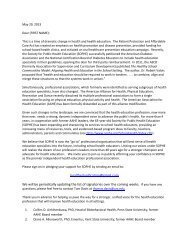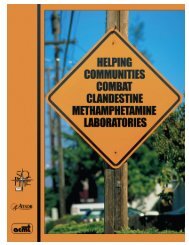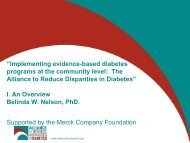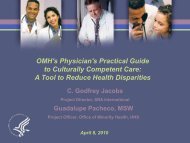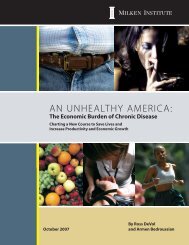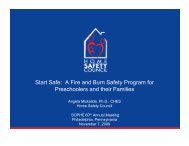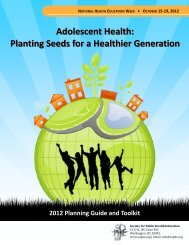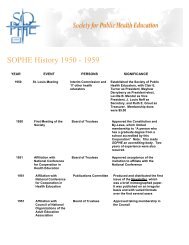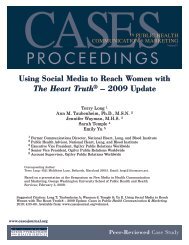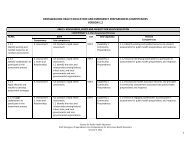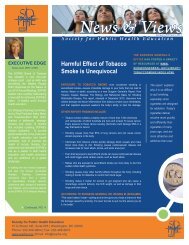Download - Society for Public Health Education
Download - Society for Public Health Education
Download - Society for Public Health Education
- No tags were found...
You also want an ePaper? Increase the reach of your titles
YUMPU automatically turns print PDFs into web optimized ePapers that Google loves.
Conference AbstractsThe Department of Family and Community Medicine incollaboration with the Master of <strong>Public</strong> <strong>Health</strong> (MPH) programin the Jefferson School of Population <strong>Health</strong> received five yearfunding from the <strong>Health</strong> Resources & Services Administration(HRSA) to develop a new scholarly concentration within themedical school entitled, “Population <strong>Health</strong> College Withinthe College” (PH CwiC). First year medical students elect toparticipate in this concentration throughout their four yearsof medical education. Population health topic areas includethe ecological model of health, social determinants of health,<strong>Health</strong>y People 2020, primary and secondary prevention andhealth promotion, inequities and cultural competency, healthliteracy, public health policy and advocacy, global health,and public health ethics. CwiC students receive ongoingmentoring from multi-disciplinary faculty across the universityand complete a scholarly capstone project in the last year ofthe concentration. Those students choosing to earn an MD/MPH degree receive transfer credits from the CwiC programtoward the MPH degree which is conferred simultaneouslywith their MD at the end of five years of school. Twenty-eightstudents, (11% of the class) self-selected into the 2011 PHCwiC, the first year of the program. Baseline demographicdata, and knowledge and attitudes towards populationhealth will be presented along with end of year assessmentof the learning objectives and program satisfaction. Asummary of the four year curriculum including didactics,experiential learning activities, community service, andresearch requirements will be provided. Strategies and lessonslearned from our first year’s experience with integratingpopulation health principles, and infusing health educationand promotion in medical education will be discussed.Developing a Theory-Based Lay <strong>Health</strong> WorkerTraining Program to Promote Colorectal CancerScreening Among Chinese AmericansLei-Chun Fung, MPH, MSW, CHES, Chinatown <strong>Public</strong> <strong>Health</strong> Center,San Francisco Department of <strong>Public</strong> <strong>Health</strong>; Gem Le, PhD, MHS,Division of General Internal Medicine, University of Cali<strong>for</strong>niaSan Francisco; Janice Tsoh, PhD, Department of Psychiatry,University of Cali<strong>for</strong>nia San Francisco; Tung Nguyen, MD, Divisionof General Internal Medicine University of Cali<strong>for</strong>nia San FranciscoBackground: Although colorectal cancer (CRC) is thesecond most common cancer among Chinese Americans,screening rates remain low in this population compared tonon-Hispanic whites. As part of a randomized controlledtrial, a community-academic research team aimed to recruitand train 26 lay health workers (LHWs) to promote CRCscreening among 312 Chinese Americans aged 50-75 in SanFrancisco, CA. The training team developed a lay healthworker orientation manual, a CRC training manual, a bilingualCRC flip chart and a CRC brochure, which were used in thetraining program. Theoretical Framework: This LHW trainingprogram incorporated the stages of change concept from theTranstheoretical Model (TTM), which provides a conceptualframework in understanding how people change behaviors.Using this framework, LHWs were trained to assess theirparticipants’ stages of change and to tailor their support toeach participant according to where the participant is in thestages of change in adopting CRC screening. Methods: Duringthe first of four waves of training, the research team trained sixLHWs and conducted a 2.5 days training program in Chinese.The training program covered research methods, recruitmentMCHES Sessionstechniques, knowledge of CRC and its prevention, how toconduct small group educational sessions, and telephonefollow ups. Each LHW recruited 12-15 participants from theirsocial network, conducted two small group sessions, twofollow-up telephone calls, and completed activity logs todocument recruitment and intervention activities. Evaluationincludes pre- and post-training surveys of LHWs, ethnographicobservations of LHW training sessions and LHW-led smallgroup sessions, and a post-intervention focus group with theLHWs. Results/Conclusions: Findings from Wave 1 training,pre- and post-surveys and focus groups show that the trainingprogram is effective in teaching LHWs about CRC preventionand how to conduct outreach to promote CRC screening.LHWs understood the research considerations, improvedtheir knowledge about CRC and its prevention, and graspedthe stage-based approach. Implications <strong>for</strong> practice: CRCLay <strong>Health</strong> Worker intervention is feasible in delivering CRCscreening in<strong>for</strong>mation to Chinese Americans using a stagebasedapproach. The bilingual educational materials beingdeveloped <strong>for</strong> colorectal cancer prevention will be useful toChinese American communities and those who serve them.Train the Trainer: A <strong>Health</strong> <strong>Education</strong>al Modelto Promote Evidence-Based Decision MakingAmy Ramsay, BA, Association of State and Territorial <strong>Health</strong>Officials; Albert Terrillion, DrPH, MPH, MPS, MEd CPH, CHES,Association of State and Territorial <strong>Health</strong> OfficialsBackground: In an era of health re<strong>for</strong>m and in light of thegrowing complexity of public health problems, an increasedfocus has been cast on the integration of evidence-basedapproaches to program and policy development. TheCommunity Guide is a resource developed by the CDC tohelp users identify evidence-based program and policyinterventions that are proven to be effective. Evidence-basedprograms require a unique set of skills; however less than halfof public health practitioners have received <strong>for</strong>mal educationin a public health discipline.[i] Theoretical Framework andMethodology: Training models in evidence-based publichealth (EBPH) have the greatest impact and reach whentraining is delivered in a train-the-trainer (TTT) <strong>for</strong>mat byexperts in the field.[ii] The Association of State and Territorial<strong>Health</strong> Officials (ASTHO) adopted a TTT educational model tobuild capacity and leadership of national non-profit staff tosupport the integration of EBPH into health policy and programdevelopment. The model combined a comprehensive seriesof didactic and interactive sessions led by an expert faculty ofEBPH practitioners, academicians, and researchers to educateparticipants on EBPH competencies and The CommunityGuide. Pre and post tests measured improvements in staffknowledge from the training, and time-series evaluationsassessed improved capacity and use of in<strong>for</strong>mation learnedover time. Hypothesis: Utilizing a TTT model to educate publichealth professionals will increase capacity and leadershipto promote evidence-based decision making (EBDM) at thestate and local level. Results: Participant responses on everysurvey indicator yielded an improvement in knowledge andskills from pre-test to post-test data. The workshop increasedparticipant awareness of the rationale and necessity <strong>for</strong> EBPHby 12% and increased participant confidence in their skills topromote the use of The Community Guide among constituentsby 46%. Implications <strong>for</strong> Practice: Training the trainer inevidence-based practice is critical <strong>for</strong> equipping healthSOPHE 62nd Annual Meeting17




